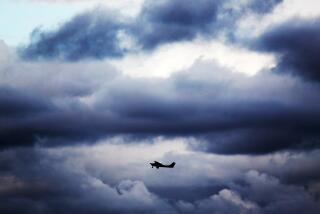Science Panel Faults Air Quality Aboard Passenger Jets
- Share via
WASHINGTON — The air quality aboard jetliners can be hazardous to passengers’ health, the National Academy of Sciences said Thursday, as it called for an ambitious monitoring program that could lead to stricter federal requirements.
“Available exposure information suggests that environmental factors, including air contaminants, can be responsible for some of the numerous complaints of acute and chronic health effects in cabin crew and passengers,” a panel convened by the Academy’s National Research Council said in the first major report on the subject in more than 15 years.
The 13-member panel said areas of concern for passengers and crew members include cabin pressure, ozone and carbon monoxide levels, and potential exposures to pesticides and fumes from engine oil, hydraulic fluids and de-icing liquid. However, ventilation systems “do not appear” to facilitate the spread of viruses and infections, it said.
Although smoking has been banned aboard airliners for more than a decade, “many of the other issues about aircraft cabin air quality have yet to be addressed adequately by [the Federal Aviation Administration] and the airline industry,” the report concluded.
The report also called for the federal government to launch a major research program into the quality of cabin air, to be overseen by an independent scientific advisory board.
Standards are inadequate in several areas, the report said. For example, the FAA requirement for cabin air pressure was set in 1964 “without any rationale,” said Eileen Abt, one of the study’s staff directors. “It has never been revisited,” she added. Even in a pressurized cabin, the panel said the air may be too thin for people with heart and lung problems and for the very young.
The report represents a major challenge to government and industry, said Dr. Russell Rayman, a panel member and executive director of the Aerospace Medical Assn., which represents health professionals working in aviation and space medicine.
“They have to be willing to take action that will require a considerable amount of resources,” Rayman said. “How far they will go with it is anybody’s guess. Obviously they have other things on their plate right now with terrorism. The timing may not have been the best.”
The report was originally scheduled for release at the end of September, but the date was postponed out of concern that its recommendations would go unnoticed because of the focus on the terrorist attacks and their aftermath, Abt said.
The FAA reacted cautiously to the 246-page report. “We need a little time to review it ourselves,” said spokeswoman Alison Duquette. “Previous studies have not shown that the air you breathe on an aircraft has negative health consequences.” However, the panel said those studies are too few and too limited for sweeping conclusions.
The air that passengers and crew members breathe aboard a jetliner is a combination of outside air brought in through the engines and air from the cabin that is filtered and recirculated.
Among the issues of “high” and “moderate” concern cited in the report were:
* Cabin pressure. Federal regulations say the air pressure aboard a jet at cruising altitude must be no less than it would be on the ground at an elevation of 8,000 feet. But the panel said the standard may be insufficient to protect very young children and people who are in poor health.
* Ozone. The pollutant, which is known to irritate breathing passages and diminish lung capacity, occurs in greater concentrations high in the atmosphere. But only newer aircraft are equipped with converters that neutralize ozone. The panel said the FAA should require all commercial jets to have such equipment or restrict the cruising altitude of those that don’t.
* Carbon monoxide. Even low concentrations can cause headaches and lightheadedness. High concentrations can occur when there are problems with an aircraft’s ventilation system. But there is no system for monitoring carbon monoxide levels.
* Pesticides. Some foreign countries still require flights from abroad to be sprayed with insecticides. In the U.S., the practice has long been abandoned because of concerns about health effects.
The study won praise from the Assn. of Flight Attendants, which has long been concerned about air quality aboard airliners. “It shows that basically the FAA has failed to monitor and regulate the air quality on aircraft to protect public health,” said Christopher Witkowski, the union’s director of health issues.
More to Read
Sign up for Essential California
The most important California stories and recommendations in your inbox every morning.
You may occasionally receive promotional content from the Los Angeles Times.










